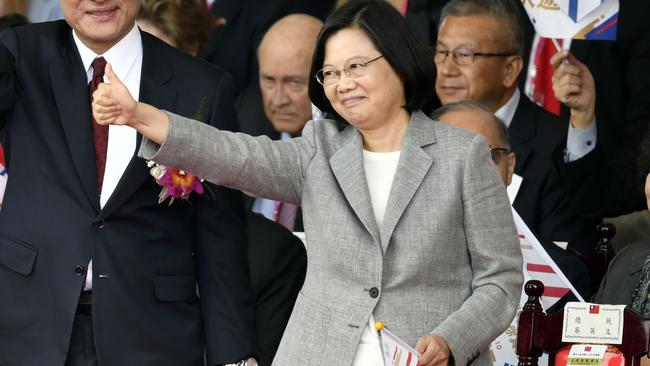Strait and narrow relationship: Taiwan seeks broader ties as tensions with China rise
Taiwan is aiming to diversify its economic focus away from China and towards Southeast Asia, Australia and India.

Taiwanese President Tsai Ing-wen has pledged to tackle “the expansion of Chinese influence” in the face of “tremendous pressure”, and urged the development of new global supply chains that are less vulnerable to the deepening US-China trade war.
In her powerful National Day address outside the presidential office in Taipei, she said the trade war was driving “a restructuring of the global industrial division of labour, with repercussions for the existing economic and trade order”.
Taiwan depends even more heavily than Australia on exports to China, where its hi-tech companies such as Foxconn assemble products sold by Apple and other global brands, using components from Taiwan and elsewhere.
It is also the heaviest single investor in China. But the government of Ms Tsai is promoting a “New Southbound” policy to diversify its economic focus towards Southeast Asia, Australia and India.
She pledged to “fully support Taiwan companies that are willing to return here and invest, and assist those companies that want to invest in other countries”.
Responding to the US-China trade war, she said it was necessary to build closer links with and between “advanced industrial entities such as the US, Europe and Japan in cutting-edge manufacturing to create new, high-efficiency supply chains”.
She said that “the international community is concerned about China’s attempts to challenge the regional status quo”, and admitted that “as Taiwan is on the frontline of the Western Pacific, we are naturally subject to tremendous pressure”.
Ms Tsai complained that “China’s unilateral diplomatic offensive and military coercion had not only harmed cross-strait relations, they have also seriously challenged the status quo of peace and stability in the Taiwan Strait.” The entire world was having to face the expansion of Chinese influence, she said — but “the international community will never approve of the violation of universal values”.
She called on the authorities in Beijing, “as a responsible major power, to play a positive role in the region and the world, instead of being a source of conflict”.
The current challenges to Taiwan’s national security, Ms Tsai said, “go beyond traditional defence and military security” to include also “diplomatic pressure, social infiltration, and (pressure on) economic security”.
Taiwan’s strategic choice was clear, Ms Tsai said: “To staunchly defend freedom, democracy, and the market economy.”
These fundamental values, she said, “have been important foundations in helping Taiwan become a model of Asian democracy and develop a strong economy” — the 22nd-largest in the world. Australia is 13th.
In next month’s local elections Ms Tsai’s Democratic Progressive Party faces its first major political test since wresting power from the Kuomintang (Nationalist) in early 2016 — with domestic economic issues uppermost.
She talked of improving economic indicators, and of the need “to have everyone share in the growth dividend”, crucial for such a centre-left government.
She listed Google, Microsoft, Cisco and Facebook among companies setting up research centres in Taiwan, or proposing new collaborations there, and said a new “wind power industry chain” was emerging, with Australia’s Macquarie playing the leading role, with a $1 billion investment.
Ms Tsai, pledging to raise the military budget annually, said the national defence industry would start manufacturing submarines and advanced training aircraft.
Taiwan’s transition from one-party state to democracy, she said, “remains a beacon in the night” for “all our friends who are pursuing democracy in Hong Kong, in mainland China, and around the world”.
Rowan Callick is visiting Taiwan as a guest of the Foreign Ministry


